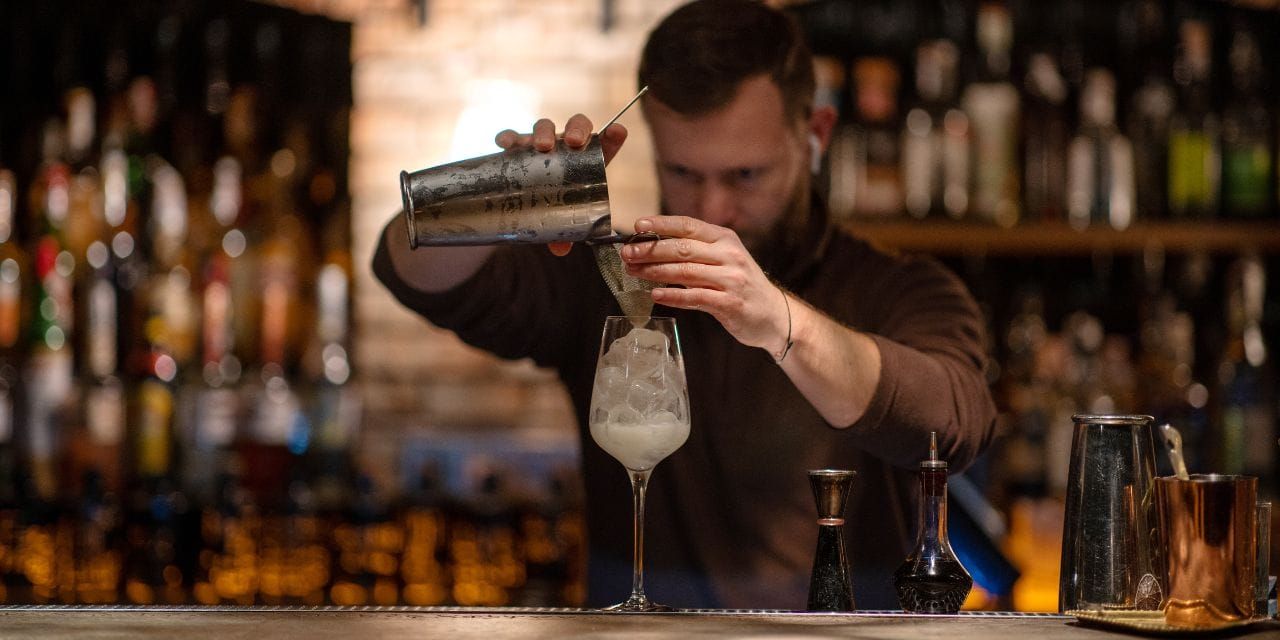How To Build Your Bartender Brand: Key Takeaways
- Building a strong Bartender brand involves defining your unique style, developing signature drinks and maintaining a professional appearance and workspace.
- Outstanding customer service, deep drink knowledge and engaging with guests help establish a memorable personal brand that encourages repeat business.
- Expanding your brand through partnerships, teaching certifications, content creation and writing can open new career opportunities and increase visibility.
While mixing drinks lays the groundwork, creating a successful Bartender brand goes beyond just having technical skills.
In this article, we’ll guide you on how to build your Bartender brand and become the standout Bartender that guests specifically ask for by name.
What Makes a Successful Bartender Brand
A clear understanding of what makes you unique in the industry will help you build a successful Bartender brand.
Your brand identity creates opportunities to stimulate career growth, build customer loyalty and develop rewarding partnerships. That said, let’s explore the key brand elements.
Key brand elements
Your unique selling proposition (USP) is the cornerstone of your Bartender brand. Whether you excel at creating innovative cocktails, providing exceptional service or crafting unforgettable experiences, your USP sets you apart from the competition.
Additionally, your visual identity is crucial for brand recognition. Make sure your personal style, presentation techniques and craft showcase are distinctive and consistent across all platforms.
To further strengthen your Bartender brand, focus on developing expertise in specific areas. Becoming an authority on particular spirits or mixing methodologies can open doors to guest bartending opportunities and speaking engagements.
Listening to customer feedback and staying adaptable to changing preferences will enhance your offerings and help you continuously improve as a Bartender.
Common mistakes to avoid
A Bartender's professional reputation can be compromised by several critical errors. For instance, inconsistent measuring and poor organization can lead to drinks that vary significantly in taste and quality.
When the workstation is cluttered, service slows down, creating an unprofessional image.
Poor ice management and improper glass handling can create problems, too. The wrong amount of ice will affect your drink's temperature, dilution and visual appeal.
Clean and proper sanitization practices matter — you should hold glassware by the stem or base to maintain hygiene standards.
Effective communication is another key area where mistakes can harm your brand. During busy rush hours, clear and direct interaction with customers and coworkers is crucial.
The best Bartenders remain composed under pressure, approaching challenging situations with professionalism and grace.
How To Build Your Bartender Brand: Key Steps
Your Bartender brand needs a strong foundation built on three elements: venue selection, signature drinks and essential tools. These components blend together to create your unique professional identity.
1. Pick your target venues
The venue type you choose will shape your career path and skill growth.
Customers at high-end venues look for sophisticated experiences, which gives you better chances to develop signature cocktails and build a loyal following. Local bars and pubs let you create deeper connections with regular patrons.
2. Create your signature drinks
A signature cocktail becomes your calling card that shows your venue's style and creativity. Start by finding your brand's core identity and pick ingredients that match your values.
The next step is to perfect the balance between sweetness, bitterness and acidity.
Incorporating local or seasonal ingredients helps establish a genuine connection with your community. Your brand's aesthetic should also reflect this connection by aligning with your choice of glassware and garnishes
3. Build your tool kit
A well-organized tool kit is key to preparing drinks like a pro. First and foremost, keeping your tools clean and organized is essential; it helps you serve drinks quickly and ensures your workspace looks professional in front of your guests.
Start with the essentials: jiggers for precise measurements, cocktail shakers, strainers, muddlers and bar spoons. Opt for durable stainless steel tools, as they’ll withstand heavy use and last for years.
As you experiment with creating your signature drinks, you may find that some specialty tools come in handy. For instance, a high-quality citrus press can elevate your cocktails by making it easy to squeeze fresh juices.
See also: Best Practices for Maintaining Bar Tools
4. Develop a personal style and presence
Develop your personal style and presence by cultivating a confident and authentic approach behind the bar that reflects your personality and brand values. Engage with customers in a genuine manner to build rapport and loyalty.
Additionally, leverage social media to showcase your cocktail creations, share behind-the-scenes moments and connect with your audience beyond the bar.
5. Focus on creating consistency and reliability in your drinks and service
Focus on serving each cocktail with consistent quality — great taste and presentation every time. Create clear routines and standard procedures for your signature drinks to help keep everything uniform.
It’s also important to work closely with your team or colleagues to maintain high standards across all shifts. This will help build trust and a professional vibe behind the bar.
6. Build your network actively
Attend industry events, Bartender competitions and networking functions to meet fellow professionals and gather inspiration. Collaborate with local suppliers or artists to create unique experiences or products that reflect your brand.
Use feedback from your network to adapt and grow your personal brand over time.
7. Market your personal brand thoughtfully
Design branding elements such as a logo, business card or website that match your style and values. Share your journey, signature cocktails and achievements on social media to gain followers and attract clients.
Consider hosting special events, cocktail classes or tastings to showcase your skills and draw in new patrons.
8. Gather testimonials and achievements
Collect positive feedback from customers and event hosts to strengthen your credibility. Participate in industry awards or competitions to gain wider recognition.
Promote these accomplishments through your marketing channels, website and social media to build trust and visibility.
9. Stay passionate and authentic
Keep your enthusiasm alive by experimenting with new ideas, trends and techniques. Always stay true to your brand’s core identity and values.
Be open to evolving with the industry while maintaining your genuine style so that your authenticity continues to resonate with clients and patrons.
Taking Your Bartender Brand Further
Your Bartender brand can grow beyond the bar and create many career opportunities. This growth mainly happens through strategic collaborations, education and content creation.
Starting brand partnerships
Spirit companies actively seek experienced Bartenders to serve as brand ambassadors, recognizing the unique industry insights and customer relationships these professionals bring.
Before pursuing partnerships, it's essential to establish strong connections within your local bar community. Spirit brands look for Bartenders who truly understand bar culture and can authentically connect their products with consumers.
As a brand ambassador, you'll need to embrace a variety of roles. One day, you might organize promotional events, while the next could involve crafting signature cocktails for publications.
This position often entails frequent travel, as you'll represent the brand at industry events and train fellow Bartenders on product knowledge and usage.
Teaching bartending classes
Professional certification programs are an excellent way to showcase your expertise. For instance, completing the ServSafe Alcohol training program enables you to train others in essential safety protocols.
Additionally, you have the opportunity to develop specialized courses centered around craft cocktails or wine service. Many venues are eager to hire qualified trainers to lead staff development programs, which can open up additional income streams for you.
By leveraging your skills in this way, you can enhance both your professional standing and your financial prospects.
Writing about drinks
Content creation gives you another path to expand your brand. Successful drinks writers usually start by finding their voice through personal blogs or industry publications.
The secret is to find your specialty. You could cover specific spirit categories or learn about regional drinking cultures.
While the drinks writing field has become more competitive, there are still ample opportunities for writers with fresh perspectives. Build strong relationships with editors and understand what different audiences want, from trade publications to consumer magazines.
Your expertise could lead to writing cocktail books or getting regular columns in industry publications.
Elevate Your Career With OysterLink
Success as a Bartender demands dedication, expertise and a commitment to continuous growth. While mastering the technical aspects of mixology forms a strong foundation, it's your unique personality and service style that truly set your Bartender brand apart in this competitive field.
To further enhance your journey and elevate your career, consider exploring OysterLink. This platform offers valuable resources, industry insights and career advice tailored for Bartenders and hospitality professionals.



.png)

.png)
.png)